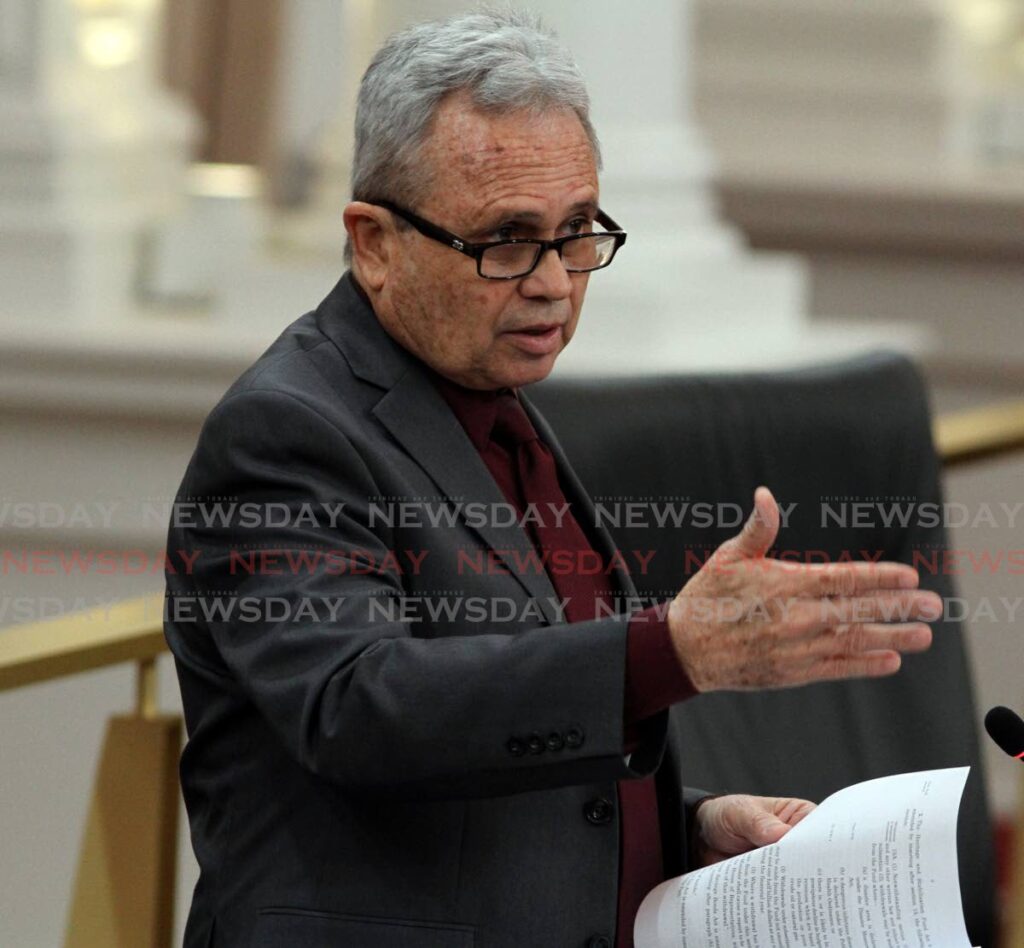Imbert: IMF says Trinidad and Tobago in sustained recovery

FINANCE Minister Colm Imbert said the International Monetary Fund (IMF) is pleased that steps taken and being taken by Government are contributing to a sustained economic recovery.
In a statement issued by his ministry on March 11, Imbert said this position was articulated by the IMF in its latest Article IV report on Trinidad and Tobago.
He added that the findings of the IMF only happened because his ministry and the Government "have exercised fiscal discipline over the last eight years, thus creating the conditions for sustained growth.
The IMF’s 2024 Article IV visit to Trinidad and Tobago occurred between February 28-March 8.
During that time, the IMF mission met with a number of stakeholders, government departments, private-sector organisations and state institutions and comprehensively analysed detailed economic data on Trinidad and Tobago.
In its Article IV report, also issued on March 11, the IMF said, "For the first time in a decade, Trinidad and Tobago is undergoing a gradual and sustained economic recovery. Real Gross Domestic Product (GDP) rebounded in 2022 and is estimated to have further expanded by 2.1 per cent in 2023.
The IMF attributed this to the strong performance of the non-energy sector which was partially offset by a contraction in the energy sector.
Inflation declined to 0.3 per cent in January after peaking at 8.7 per cent in December 2022.
The IMF said the latter inflation figure was due to declining food and imported goods' inflation.
The IMF was also satisfied that Trinidad and Tobago's foreign reserves coverage was adequare at 6.6 months of prospective total imports by 2029.
The fiscal balance in last financial year was broadly in line with the 2023/2024 budget.
The IMF said, "The overall fiscal deficit is estimated at 1.1 per cent of GDP in Financial Year 2023, 0.2 percentage points better than initially budgeted. This reflects higher non-energy revenue and lower than budgeted capital expenditure."
Public financial buffers, the IMF continued, remained strong with total assets in the Heritage and Stabilization Fund at US$5.5 billion (19.2 percent of GDP) by the end of the last financial year.
The IMF projected real GDP to expand by 2.4 per cent this year.
This growth is being linked to non-energy sector and new energy projects coming onstream that the IMF saidh will help offset the structural decline in energy production.
"Over the medium term, the delivery of several planned natural gas projects is expected to boost growth in the energy sector, while supporting economic activity in the non-energy sector."
While the IMF viewed Trinidad and Tobago's economic outlook as positive, it did identify some risks.
"In the near term, downside risks stem from external factors affecting energy markets (eg, an abrupt global slowdown) and disappointments in domestic energy production (eg., delays in new projects or unexpected disruptions in current production). In the medium term, the balance of risks is to the upside, stemming from additional new natural gas projects and the implementation of planned structural reforms, which could boost growth."
The IMF said maintaining fiscal discipline while strengthening Trinidad and Tobago's fiscal framework is important.
While the 2023/2024 budget is appropriate to support doemstic recovery and address infrastructural needs, the IMF estimated the fiscal deficit will widen to 2.7 per cent of GDP in the next financial year.
"This reflects lower energy revenues due to declining prices and domestic production, increased capital spending, and a higher wage bill—due to the long-standing public wage settlement with some unions. "
The IMF said planned capital spending by Government should address infrastructural needs and boost growth.
The proclamation of the Procurement and Disposal of Public Property Act last April was welcomed by the IMF as a tool that will enhance the legal and institutional framework for transparent and competitive public procurement, improve the efficiency and quality of public spending.
The IMF welcomed initiatives by Government to such as collection of property tax and operationalisation of the Revenue Authority that would rebuild financial buffers to respond to potential shocks to the economy.
"Additional revenue could be generated by adjusting the fiscal regime of the energy sector, boosting non-energy revenue, and strengthening tax compliance and administration."
The IMF also advised Government to continue gradually phasing out subsidies while protecting the most vulnerable, streamlining transfers to state-owned enterprises and improving the quality of public spending.
With respect to pensions, the IMF welcomed considerations by the authorities to increase the retirement age from 60 to 65. In the absence of pension reforms and measures to sustain the pension system (such as increasing the contribution rate), the IMF said the National Insurance System's reserves could be depleted by the mid-2030's.
The IMF was pleased with efforts by the authorities to provide foreign exchange (forex) to small and medium enterprises through the Import Exim Bank.
To address forex shortages in the long term, the IMF suggested, "moving toward a more efficient and market-clearing infrastructure for allocating forex would help create a more conducive business environment for the private sector to invest and diversify the economy."
Imbert has publicly indicated on several occasions that Government will not take any measures that will result in the devaluation of the TT dollar.


Comments
"Imbert: IMF says Trinidad and Tobago in sustained recovery"